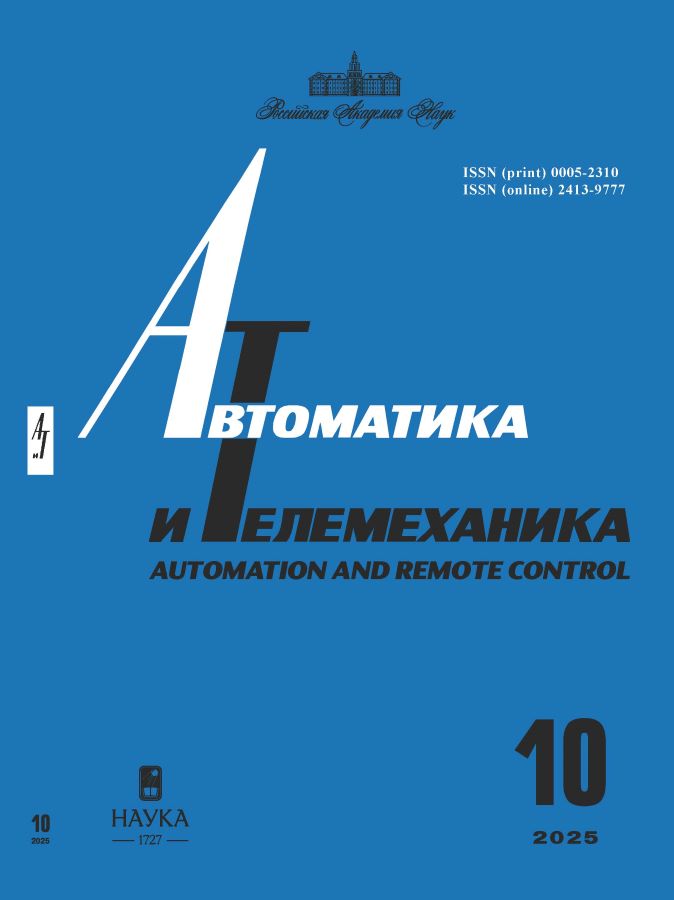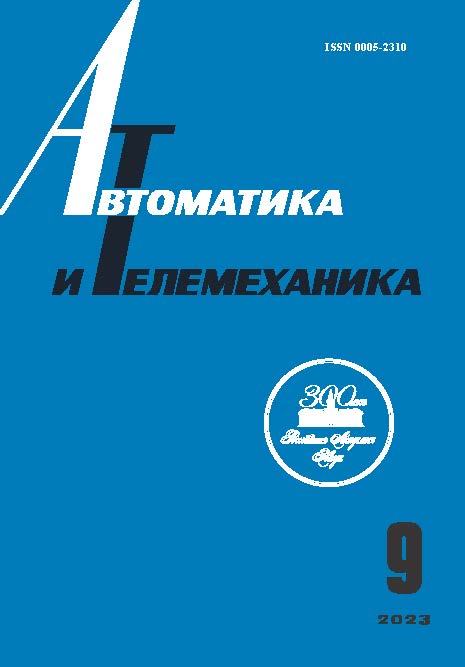Minimizing the Total Weighted Duration of Courses in a Single Machine Problem with Precedence Constraints
- Authors: Musatova E.G.1, Lazarev A.A.1
-
Affiliations:
- Trapeznikov Institute of Control Sciences, Russian Academy of Sciences
- Issue: No 9 (2023)
- Pages: 153-168
- Section: Optimization, system analysis, and operations research
- URL: https://jdigitaldiagnostics.com/0005-2310/article/view/646739
- DOI: https://doi.org/10.31857/S000523102309009X
- EDN: https://elibrary.ru/JUNOUZ
- ID: 646739
Cite item
Abstract
A single machine scheduling problem with a given partial order of jobs is considered. There are subsets of jobs called courses. It is necessary to schedule jobs in such a way that the total weighted duration of all courses is minimal. We consider the case when the initial job and the final one of each course are uniquely determined. The NP-hardness of the problem under consideration is proved. We propose an algorithm for solving the problem, the complexity of which depends polynomially on the total number of jobs, but exponentially on the number of courses, which makes it possible to use it efficiently with a fixed small number of courses and an arbitrary number of jobs.
About the authors
E. G. Musatova
Trapeznikov Institute of Control Sciences, Russian Academy of Sciences
Email: nekolyap@mail.ru
Moscow, Russia
A. A. Lazarev
Trapeznikov Institute of Control Sciences, Russian Academy of Sciences
Author for correspondence.
Email: jobmath@mail.ru
Moscow, Russia
References
- Brucker P. Scheduling algorithms. Springer: Heidelberg, 2007.
- Лазарев А.А. Теория расписаний. Методы и алгоритмы. М.: ИПУ РАН, 2019.
- Lazarev A., Khusnullin N., Musatova E., Yadrentsev D., Kharlamov M., Ponomarev K. Minimization of the weighted total sparsity of cosmonaut training courses // Optimization and Applications. OPTIMA 2018. Communications in Computer and Information Science. 2019. P. 202-215.
- Harhalakis G. Special features of precedence network charts // Eur. J. Oper. Res., Elsevier Publ. 1990. V. 49. No. 1. P. 50-59.
- Cs'ebfalvi A.B., Cs'ebfalvi G. Hammock activities in project scheduling // Proceedings of the Sixteenth Annual Conference of POMS. 2005.
- Eliezer O. A new bi-objective hybrid metaheuristic algorithm for the resourceconstrained hammock cost problem (RCHCP) / Doctoral Dissertation. P'ecs, 2011.
- El-Rayes K., Moselhi O. Resource-driven scheduling of repetitive activities // Construction Management and Economics. 1998. V. 16. No. 4. P. 433-446.
- Vanhoucke M. Work continuity constraints in project scheduling / Working Paper 04/265, Ghent University, Faculty of Economics and Business Administration, Belgium. 2004.
- Vanhoucke M., Van Osselaer K. Work continuity in a real-life schedule: the Westerschelde Tunne / Working Paper 04/271, Ghent University, Faculty of Economics and Business Administration, Belgium. 2005.
- Graham R.L., Lawler E.L., Lenstra J.K., Rinnooy Kan A.H.G. Optimization and approximation in deterministic sequencing and scheduling: a survey // Annals of Discrete Mathematics, Elsevier Publ. 1979. V. 5. P. 287-326.
- Lenstra J.K., Rinnooy Kan A.H.G. Complexity of scheduling under precedence constraints // Oper. Res. 1978. V. 26. No. 1. P. 22-35.
- Cormen T.H., Leiserson C.E., Rivest R.L., Stein C.Introduction to algorithms. MIT press, 2022.
- IBM ILOG CPLEX Optimization Studio // URL: https://www.ibm.com/products/ilog-cplex-optimization-studio.
- Potts C.N. An algorithm for the single machine sequencing problem with precedence constraint / Combinatorial Optimization II. Mathematical Programming Studies, Springer: Berlin, Heidelberg, 1980. V. 13. P. 78-87.
Supplementary files











